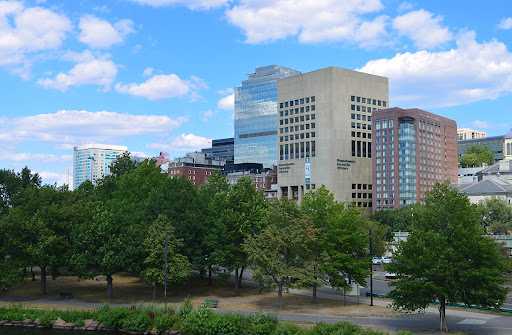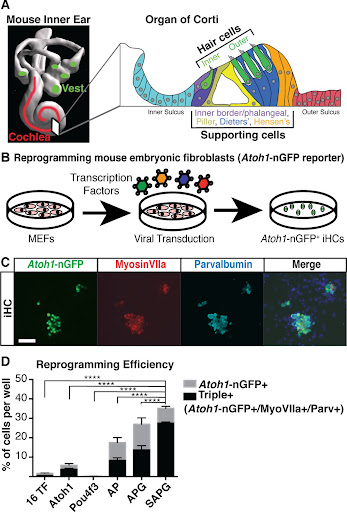November 27th, 2022 – Charles Liberman, PhD has been awarded The Scientific Grand Prize from La Fondation Pour l’Audition
The Scientific Grand Prize from La Fondation Pour l’Audition is offered to one exceptional scientist who has made a significant contribution to the field of hearing research. This year, the Grand Prize was presented to Charles Liberman, Ph.D., in recognition of his groundbreaking work in understanding and treating hearing loss.
Who is Charles Liberman, Ph.D. and what does he do?
Charles Liberman, Ph.D. is a Professor at Harvard Medical School and the Director of the Eaton-Peabody Laboratories at Massachusetts Eye and Ear Infirmary.

Harvard Medical School | Boston, MA
Dr. Liberman is recognized for his pioneering work in the field of auditory neuroscience which has led to a greater understanding of the underlying mechanisms of hearing loss, as well as potential treatments for hearing disorders such as tinnitus and age-related hearing loss. His research has been instrumental in bringing advances from basic science into clinical studies and identifying new therapeutic targets to prevent or cure disabling hearing problems. Dr. Liberman has also served on multiple scientific advisory boards including the National Institutes of Health (NIH) Auditory Physiology Study Section, the US Food & Drug Administration (FDA) Ototoxicity Panel and the World Health Organization Expert Group on Hearing Loss Prevention. He is an active advocate for people with hearing loss and works closely with industry
How has Charles Liberman, Ph.D.’s research impacted what is known about the cause of hearing loss in the inner ear?
Charles Liberman, Ph.D.’s research has “upended the dogma of what was known about the cause of hearing loss in the inner ear,” says Mark A. Varvares, MD, FACS. For many years, it was believed that hair cells in the inner ear were responsible for converting sound waves into electrical impulses that are then sent to the brain. However, through his research, Charles Liberman, PhD has demonstrated that this is not the case. In fact, he has shown that when hair cells are lost due to damage or age, they can be replaced by neighboring cells which take on the function of hair cells and allow people to regain their hearing. This new understanding of how hearing works could have a profound impact on how we treat hearing loss in the future.
How will Dr. Liberman’s study of otoacoustic emissions (OAEs) impact this topic?
 Dr. Charles Liberman’s research on otoacoustic emissions (OAEs) has provided valuable information on the assessment and treatment of hearing loss in both children and adults. OAEs are sounds that are generated by the inner ear, and by studying them, Dr. Liberman hopes to develop new methods of prevention and treatment for hearing loss that is more accurate and efficient than current methods. He has identified various features of these emissions that can help doctors to better assess hearing loss, and he has used this knowledge to develop new methods for assessing and treating patients with hearing impairments.
Dr. Charles Liberman’s research on otoacoustic emissions (OAEs) has provided valuable information on the assessment and treatment of hearing loss in both children and adults. OAEs are sounds that are generated by the inner ear, and by studying them, Dr. Liberman hopes to develop new methods of prevention and treatment for hearing loss that is more accurate and efficient than current methods. He has identified various features of these emissions that can help doctors to better assess hearing loss, and he has used this knowledge to develop new methods for assessing and treating patients with hearing impairments.
Furthermore, his work has also provided valuable insight into how exposure to loud noises contributes to hearing loss and how it can be prevented through proper protection such as earplugs or other noise-mitigation measures. This groundbreaking research is invaluable in helping to ensure that people are able to preserve their auditory health now and in the future.

What are some of the current treatments for hearing loss that Charles Liberman, PhD is researching?
One of the many treatments Dr. Liberman is researching is using stem cells to regenerate hair cells in the cochlea and other sensory cells in the inner ear. This involves taking stem cells from another part of the body, such as the bone marrow, and culturing them in a lab setting until they develop into sensory cells. These new cells could then be transplanted back into the ear, where they would replace the damaged or lost cells, but more research is needed to determine if this is a viable option.
 Another possible approach is to use gene therapy to promote the growth of new hair cells, and while this method has shown some promise, further research is needed to evaluate its effectiveness. His team is also studying ways to stimulate auditory neurons with electrical stimulation in order to restore hearing. This procedure involves implanting a stimulator into the cochlea and providing an electrical current to the auditory nerve. This stimulation helps to re-establish the connection between the auditory nerve and the brain, which can help people with hearing loss to regain some or all of their lost hearing. They are exploring how these treatments might be combined with other existing therapies, such as cochlear implants, for a more effective treatment. While this treatment is still being developed, it shows promise as a potential cure for hearing loss in the future.
Another possible approach is to use gene therapy to promote the growth of new hair cells, and while this method has shown some promise, further research is needed to evaluate its effectiveness. His team is also studying ways to stimulate auditory neurons with electrical stimulation in order to restore hearing. This procedure involves implanting a stimulator into the cochlea and providing an electrical current to the auditory nerve. This stimulation helps to re-establish the connection between the auditory nerve and the brain, which can help people with hearing loss to regain some or all of their lost hearing. They are exploring how these treatments might be combined with other existing therapies, such as cochlear implants, for a more effective treatment. While this treatment is still being developed, it shows promise as a potential cure for hearing loss in the future.
Lastly, his lab is exploring gene therapy techniques to regulate the production of proteins that may improve hearing loss. One technique is the use of a virus to deliver a healthy copy of the gene to the cells that are not functioning properly and in-turn correcting the cells that are not producing the protein correctly. Another gene therapy technique that is being explored is the use of CRISPR/Cas9 to edit the genes that are causing hearing loss. This could one day improve hearing loss by correcting the genetic mutations that are causing the hearing loss.
All of this research has the potential to revolutionize current treatments for hearing loss and restore hearing.
How can people with hearing loss benefit from this news?
The funding that Dr. Liberman has received will help him to continue this important work and bring these treatments to people who need them. People with hearing loss stand to benefit greatly from his research, as they will be able to receive more accurate and effective treatment options for their condition. In addition, people with hearing loss can also benefit from the advancements in noise-mitigation strategies that Dr. Liberman’s research has provided. With these strategies, people with hearing loss can better protect their ears from loud noise exposure and help to preserve their auditory health in the future. Finally, gene therapy techniques being explored by his lab have the potential to improve hearing loss by correcting genetic mutations that are causing it. This would further benefit individuals with hearing loss as they will be able to receive treatments for their condition that are more effective and tailored specifically to them.
All of these advancements provide hope for those with hearing loss who would otherwise not have access to treatment or prevention options. Dr. Charles Liberman’s research is invaluable in providing. We applaud Dr. Charles Liberman for his dedication to finding new and innovative ways to treat hearing loss and helping people regain their auditory health!
